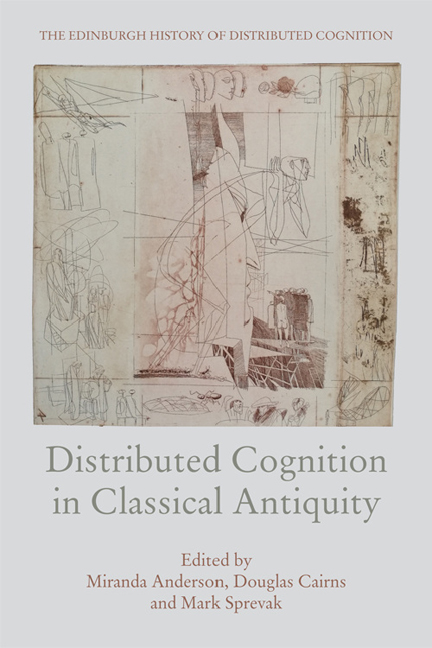Book contents
- Frontmatter
- Contents
- List of Illustrations
- Series Preface
- Miscellaneous Frontmatter
- 1 Distributed Cognition and the Humanities
- 2 Distributed Cognition and the Classics
- 3 Physical Sciences: Ptolemy's Extended Mind
- 4 Distributed Cognition and the Diffusion of Information Technologies in the Roman World
- 5 Mask as Mind Tool: A Methodology of Material Engagement
- 6 Embodied, Extended and Distributed Cognition in Roman Technical Practice
- 7 Roman-period Theatres as Distributed Cognitive Micro-ecologies
- 8 Cognition, Emotions and the Feeling Body in the Hippocratic Corpus
- 9 Enactivism and Embodied Cognition in Stoicism and Plato's Timaeus
- 10 Enargeia, Enactivism and the Ancient Readerly Imagination
- 11 Group Minds in Classical Athens? Chorus and Dēmos as Case Studies of Collective Cognition
- 12 One Soul in Two Bodies: Distributed Cognition and Ancient Greek Friendship
- 13 Distributed Cognition and its Discontents: A Dialogue across History and Artistic Genre
- Notes on Contributors
- Bibliography
- Index
7 - Roman-period Theatres as Distributed Cognitive Micro-ecologies
Published online by Cambridge University Press: 12 November 2019
- Frontmatter
- Contents
- List of Illustrations
- Series Preface
- Miscellaneous Frontmatter
- 1 Distributed Cognition and the Humanities
- 2 Distributed Cognition and the Classics
- 3 Physical Sciences: Ptolemy's Extended Mind
- 4 Distributed Cognition and the Diffusion of Information Technologies in the Roman World
- 5 Mask as Mind Tool: A Methodology of Material Engagement
- 6 Embodied, Extended and Distributed Cognition in Roman Technical Practice
- 7 Roman-period Theatres as Distributed Cognitive Micro-ecologies
- 8 Cognition, Emotions and the Feeling Body in the Hippocratic Corpus
- 9 Enactivism and Embodied Cognition in Stoicism and Plato's Timaeus
- 10 Enargeia, Enactivism and the Ancient Readerly Imagination
- 11 Group Minds in Classical Athens? Chorus and Dēmos as Case Studies of Collective Cognition
- 12 One Soul in Two Bodies: Distributed Cognition and Ancient Greek Friendship
- 13 Distributed Cognition and its Discontents: A Dialogue across History and Artistic Genre
- Notes on Contributors
- Bibliography
- Index
Summary
While Roman drama – the comedies, tragedies, pantomimes and so forth – enjoyed a very short floruit, the venue for these performances – the stone theatre – is one of the most widespread and enduring architectural types across the entire Roman Empire. The Roman-period theatre accommodated not only what are now considered typical theatrical – namely, dramatic – performances, but also festivals established by elites as public benefactions, the gathering of the civic assembly for public business and other occasions. As such, the theatre simultaneously was deeply embedded within the cultural, social and historical contexts of the cities in which they were built and played host to the activities that nurtured those contexts. Due to the variety of functions that it served, the theatre was also open to citizens and foreigners alike, with each group bringing its own knowledge – or lack thereof – of the organisation and structure, social relationships, history and public personalities specific to a city. How, in buildings designed for communal congregation and interaction, was the theatre-goer's cognition of multiple aspects of urban society supported? I argue that in this building type, cognition was distributed across the individuals in attendance, the seating arrangements and the decoration of the building. To be in the theatre was to see, occupy and know one's place relative to others and – in some cases – to the larger entities of region and empire. In other words, it was a cognitive micro-ecology.
Distributing Cognition in the Roman-period Theatre
Evelyn Tribble's model of the Shakespearean theatre as a cognitive ecology is profoundly influential on the present study. The interdependence of multiple tools and of internal and external representations in creating a functional ‘computational environment’, and the impact of evolving circumstances (for example, the creation of new kinds of charts, projections, plotting tools and so on) on different elements of this environment, or cognitive ecology, was laid out in Hutchins's Cognition in the Wild. In that work, the ‘historically contingent’ nature of humans’ understanding and usage of external tools was made clear (Hutchins 1995: 114). Using Hutchins's work as a guide, Tribble and John Sutton called for a historical cognitive science that likewise stressed a ‘system-level mode of analysis’ that not only acknowledged but centralised the notion that human cognition and its engagement with things beyond the skin was historically, culturally and socially determined and bound together (Tribble and Sutton 2011: 95–7).
- Type
- Chapter
- Information
- Distributed Cognition in Classical Antiquity , pp. 121 - 135Publisher: Edinburgh University PressPrint publication year: 2017



